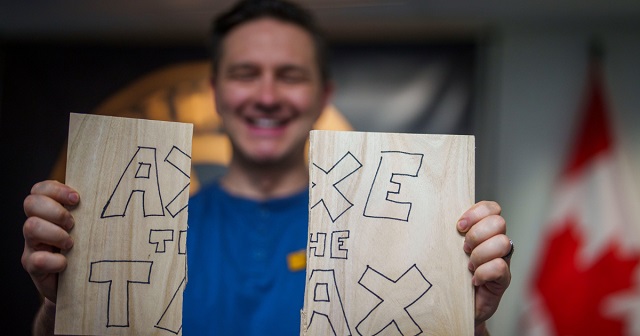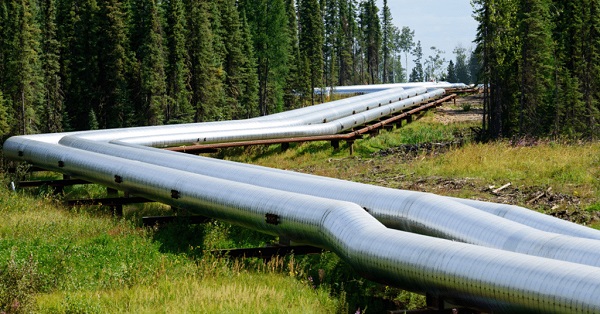Dan McTeague
The Carbon Tax ship is sinking

From Canadians for Affordable Energy

In a shocking turn of events, just weeks before the upcoming provincial election, Eby said that if re-elected his government would end the provincial carbon tax on consumers, provided the federal government removed the “legal backstop” that requires them to keep a tax in place.
Here’s a surprising development – the Carbon Tax, which was a keystone policy of the Green Left just a few short years ago is now a political pariah. Though, for some of us, it isn’t so surprising.
As you will recall, the federal Carbon Tax back was one of the Trudeau Liberals’ first announcements upon taking power. It was meant to set the tone for their commitment to tackling the “climate crisis,” and achieving net zero carbon emissions. The policy required that all provinces and territories which did not have their own carbon pricing scheme in place would have one imposed on them by Ottawa.
The Carbon Tax had buy-in from Green apologists all over the country, including many Conservative politicians. You may recall Patrick Brown, former leader of the Ontario Progressive Conservative Party, stunning an audience of PC Members in 2016 when he announced. “Climate change is a fact… We have to do something about it, and that something includes putting a price on carbon.” Ever the political opportunist, Brown had bought into the notion that you can’t win if you aren’t in favor of a carbon tax.
And that is how it was sold. The carbon tax was inevitable. And it would come with all sorts of environmental benefits – ending forest fires, floods, and combatting all manner of bad weather. Plus, the price would mainly be paid by greedy corporations. The average Canadian, they said, would actually be getting more money back on the tax rebate than they’d paid in the first place. In their telling, the carbon tax sounded like it was all carrots and no sticks!
Of course, that was too good to be true. There were, in fact, plenty of sticks. Sky-high gas prices, heating bills, food prices, and an overall increase in our cost of living. Eventually the Parliamentary Budget Office issued a report which confirmed what many Canadians had already learned, that the tax would be a net loss for most households, with the middle class being particularly hard hit.
No wonder public support started to wane, and then to spiral. Even Trudeau’s desperate rebranding – he started calling the tax “pollution pricing” – couldn’t save it.
A Leger poll released earlier this year revealed that 7 in 10 Canadians do not support the Carbon Tax. It helps that Conservative Party leader Pierre Poilievre has made ‘Axe the Tax’ a cornerstone of his campaign, consistently making the case that the Carbon Tax is harming consumers and making the country less competitive.
What was once considered the unsinkable Carbon Tax is now taking on water. And lots of it.
We saw early signs of this earlier this year when the annual Carbon Tax increase, scheduled for April 1st, was loudly opposed by a number of premiers. Even Liberal premiers, such as Andrew Furey of Newfoundland and Labrador, pleaded with Justin Trudeau to hit pause on the increase.
More recently, NDP Leader Jagmeet Singh has been waffling on the tax as currently structured, suggesting that it has “put the burden on the backs of working people.” Of course, as the Conservatives like to remind him, Singh voted in favor of this same tax twenty-four times in the House of Commons.
But perhaps the most significant nail in the carbon tax coffin came courtesy BC Premier David Eby. Remember that it was BC, under the Liberal premier Gordon Campbell, who implemented the first Carbon Tax in 2008 – not just the first in Canada, but rather, the provincial government claims, the first “revenue neutral” Carbon Tax in the world!
The Carbon Tax has been a hallmark of BC’s climate policies for nearly two decades. But in a shocking turn of events, just weeks before the upcoming provincial election, Eby said that if re-elected his government would end the provincial carbon tax on consumers, provided the federal government removed the “legal backstop” that requires them to keep a tax in place.
With Eby’s main opposition also pledged to repeal, it seems that even in the policy’s birthplace, no one wants to touch the carbon tax with a ten foot pole!
Now Eby defended the move by claiming essentially that the Trudeau Liberals’ fumbling of the issue has “badly damaged” what he says was the political consensus on the carbon tax. But the reality is that this was bound to happen eventually. In my capacity as President of Canadians for Affordable Energy, I’ve been warning Canadians for years that Trudeau’s carbon tax increase, compounded by his Clean Fuel Standard, which I’ve dubbed the Second Carbon Tax, would not only raise the price of fuel, but would increase the price of all goods, groceries included.
Once Canadians saw what the tax actually cost, and felt its devastating impact on their ability to make ends meet, to fill their gas tanks, heat their homes, and feed their families, they were bound to turn against it. This is exactly what we’re seeing now. And with elections looming, as go the voters so go the politicians who need their votes.
It seems the Carbon Tax is sinking and the rats are jumping ship.
Dan McTeague is President of Canadians for Affordable Energy.
Automotive
Canada’s EV gamble is starting to backfire

Things have only gone from bad to worse for the global Electric Vehicle industry. And that’s a problem for Canada, because successive Liberal governments have done everything in their power to hitch our cart to that horse.
Earlier this month, the Trump Administration rolled back more Biden-era regulations that effectively served as a back-door EV mandate in the United States. These rules mandated that all passenger cars be able to travel at least 65.1 miles (and for light trucks, 45.2 miles) per gallon of gasoline or diesel, by the year 2031. Since no Internal Combustion Engine (ICE) vehicle could realistically conform to those standards, that would have essentially boxed them out of the market.
Trump’s rolling them back was a fulfillment of his campaign promise to end the Biden Administration’s stealth EV mandates. But it was also a simple recognition of the reality that EVs can’t compete on their own merits.
For proof of that, look no further than our second bit of bad news for EVs: Ford Motor Company has just announced a massive $19.5 billion write-down, almost entirely linked to its aggressive push into EVs. They’ve lost $13 billion on EVs in the past two years alone.
The company invested tens of billions on these go-carts, and lost their shirt when it turned out the market for them was miniscule.
Ford’s EV division president Andrew Frick explained, “Ford is following the customer. We are looking at the market as it is today, not just as everyone predicted it to be five years ago.”
Of course, five years ago, the market was assuming that government subsidies-plus-mandates would create a market for EVs at scale, which hasn’t happened.
As to what this portends for the market, the Wall Street Journal argued, “The company’s pivot from all-electric vehicles is a fresh sign that America’s roadways – after a push to remake them – will continue to look in the near future much like they do today, with a large number of gas-powered cars and trucks and growing use of hybrids.”
And that’s not just true in the U.S. Across the Atlantic, reports suggest the European Union is preparing to delay their own EV mandates to 2040. And the U.K.’s Labour government is considering postponing their own 2030 ICE vehicle ban to align with any EU change in policy.
It’s looking like fewer people around the world will be forced by their governments to buy EVs. Which means that fewer people will be buying EVs.
Now, that is a headache for Canada. Our leaders, at both the federal and provincial levels, have bet big on the success of EVs, investing billions in taxpayer dollars in the hopes of making Canada a major player in the global EV supply chain.
To bolster those investments, Ottawa introduced its Electric Vehicle mandate, requiring 100 per cent of new light-duty vehicle sales to be electric by 2035. This, despite the fact that EVs remain significantly more expensive than gas-and-diesel driven vehicles, they’re poorly suited to Canada’s vast distances and cold climate, and our charging infrastructure is wholly inadequate for a total transition to EVs.
But even if these things weren’t true, there still aren’t enough of us to make the government’s investment make sense. Their entire strategy depends on exporting to foreign markets that are rapidly cooling on EVs.
Collapsing demand south of the border – where the vast majority of the autos we build are sent – means that Canadian EVs will be left without buyers. And postponed (perhaps eventually canceled) mandates in Europe mean that we will be left without a fallback market.
Canadian industry voices are growing louder in their concern. Meanwhile, plants are already idling, scaling back production, or even closing, leaving workers out in the cold.
As GM Canada’s president, Kristian Aquilina, said when announcing her company’s cancellation of the BrightDrop Electric delivery van, “Quite simply, we just have not seen demand for these vehicles climb to the levels that we initially anticipated…. It’s simply a demand and a market-driven response.”
Prime Minister Mark Carney, while sharing much of the same environmental outlook as his predecessor, has already been compelled by economic realities to make a small adjustment – delaying the enforcement of the 2026 EV sales quotas by one year.
But a one-year pause doesn’t solve the problem. It kicks the can down the road.
Mr. Carney must now make a choice. He can double down on this troubled policy, continuing to throw good money after bad, endangering a lot of jobs in our automotive sector, while making transportation more expensive and less reliable for Canadians. Or he can change course: scrap the mandates, end the subsidies, and start putting people and prosperity ahead of ideology.
Here’s hoping he chooses the latter.
The writing is on the wall. Around the world, the forced transition to EVs is crashing into economic reality. If Canada doesn’t wake up soon, we’ll be left holding the bag.
Dan McTeague
Will this deal actually build a pipeline in Canada?

By Dan McTeague
Will Carney’s new pipeline deal actually help get a pipeline built in Canada? As we said before, the devil is in the details.
While the establishment and mainstream media cheer on the new pipeline agreement, there are specific details you need to be aware of.
Dan McTeague explains in his latest video.
-

 International2 days ago
International2 days agoOttawa is still dodging the China interference threat
-

 Agriculture11 hours ago
Agriculture11 hours agoEnd Supply Management—For the Sake of Canadian Consumers
-

 Business2 days ago
Business2 days agoThere’s No Bias at CBC News, You Say? Well, OK…
-

 Automotive2 days ago
Automotive2 days agoCanada’s EV gamble is starting to backfire
-

 Alberta8 hours ago
Alberta8 hours agoAlberta Next Panel calls to reform how Canada works
-

 Digital ID9 hours ago
Digital ID9 hours agoCanadian government launches trial version of digital ID for certain licenses, permits
-

 Business6 hours ago
Business6 hours agoThe “Disruptor-in-Chief” places Canada in the crosshairs
-

 Artificial Intelligence7 hours ago
Artificial Intelligence7 hours agoUK Police Pilot AI System to Track “Suspicious” Driver Journeys








